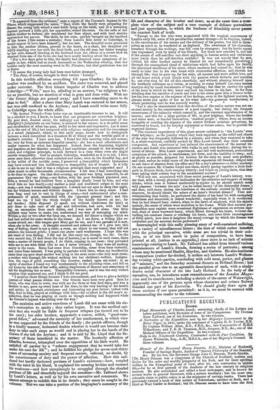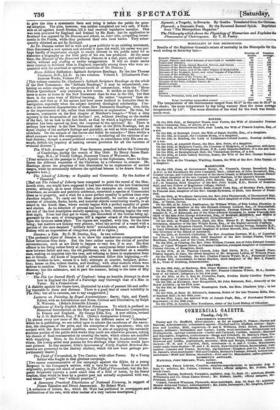PUBLICATIONS RECEIVED.
Booze.
Final Memorials of Charles Lamb; consisting chiefly of his Letters not before published, with Sketches of some of his Companions. By Thomas Noon Talfourd, one of his Executors. In two volumes. A Narrative of the Expedition sent by her Majesty's Government to 'As River Niger, in 1841, under the command of Captain H. D. TrotterES. By Captain William Allen, R.N., F.R.S., &c., late Commander of HMS Wilberforce; and T. R. H. Thomson, Surgeon, RN., Ike., one-of the Medical Officers of the Expedition. In two volumes. Italy in the Nineteenth Century, Contrasted with its Past Condition. .47 James Whiteside, Esq., A.M., M.R.LA., one of her Majesty's Counsel. ln three volumes.
Memoir of the Reverend Henry Duncan, RD., Minister of Bothwell,
Founder of Savings Banks, Author of "Sacred Philosophy of the Seasons,
&c. By his Son, the Reverend George John C. Duncan, North Shields. [Dr. Henry Duncan was a clergyman of the Church of Scotland, zealous and active for the order and worldly prosperity of his flock, and for their spiritual welfare in the Evangelical point of view, after his own conversion in middle life,—for he at first partook of the deadness of the last century in religious matters. He also established and edited a local newspaper, and is known for several works in general literature, with a serious tendency: but his most con- siderable claim to public notice is as the originator of savings banks. There had previously existed a bank of this nature at Tottenham, another at Bath, and a third at West Calder in Scotland; but Dr. Duncan seems to have been the first
to give the idea a systematic form and bring it before the public for gene- ral adoption. The plan, however, was neither completed nor very safe, if work-
able at, all against much friction, till it had received legislative sanction. This was soon procured for England and Ireland by Mr. Rose; but its application to Scotland was opposed by Dr. Duncan and others, as, inter alia, compelling invest- ments in the Funds, while they preferred their own local banks. They subse- quently obtained an act for Scotland. As Dr. Duncan rather fell in with and gave publicity to an existing movement, than discovered a new system and enforced it upon the world, his career was per- haps hardly of importance enough to excite interest in the public mind for so elaborate a biography as the filial piety of his son has produced. At the same time, the Memoir of the Reverend Henry Duncan is a real, plain, and solid nar- rative, without any stuffing or undue exaggeration. It will no doubt excite More interest in Scotland than in England, especially among those who were ac- quainted with the practical or spiritual exertions of Dr. Duncan.] Hone Biblicce Sabbaticce: Sabbath Scripture Readings. By the late Thomas Chalmers, D.D., LL.D. In two volumes. Volume L (Chalmers's Post- humous Works, Volume IV.) [This volume contains Dr. Chalmers's Sabbath Scripture Readings on the whole of the New Testament; the "Sabbath Readings," it may be remembered, con- taining an entire chapter as the groundwork of commentary, while the " Horto Biblical Quotidianse " only embraces a few verses. It strikes us that Dr. Chal- mers is more at home in the New Testament than he was in the Old, but that there is the same want of Biblical learning. He rather "improves" than ex- pounds; and that as if his nature had been more inclined to hortative than in- vestigation, especially when the subject involved theological scholarship. Unc- tion is the essential characteristic of these New Testament Readings; love, faith, or the improvement of life, rather than information or explanation. He thus, for
instance, comments on the first chapter of Matthew's Gospel-" What a deep
mystery is the Incarnation of our Saviour ! yet, without dwelling on the modus d-the fact, let us look to the fact itself, as that by which a highway of commu- nication has been opened up from the corporeal to the spiritual," &c. There is
perhaps less variety in the New Testament than in the Bible Readings, but an equal display of the author's feelings and geniality, as well as little touches of his crotchets. On the miracle of the loaves and fishes he remarks-" Here within a
short compass we see His compassion in relieving all the varieties of ac- tual distress; though a sound political economy, in coincidence with His own ex- ample, forbids the impolicy of making certain provision for all the varieties of eventual distress."] The Whole Armour of God: Four Sermons, preached before the University of Cambridge, during the month of May 1848. By Henry James Hast-
ings, M.A., of Trinity College, Honorary Canon of Worcester, &c. [Four sermons on the passage in Paul's Epistle to the Ephesians, where he illus- trates the different requisites of the Christian by a reference to armour. Mr. Hastings shows the propriety of this illustration by an explanation of ancient usages, while lie strenuously enforces the spiritual lessons to be drawn from the Apostle's text.]
The Island of Liberty; or Equality and Community. By the Author of " Theodore' [Had not The Island of Liberty been composed to point the moral of the Mon- mouth riots, one might have supposed it had been written on the late Continental
events; although, as in most didactic tales, the examples are overdone. Lord Evereham, an amiable and patriotic nobleman, entertains a species of Communist ideas as to property, and a wish for a more Perfect equality in politics than even Jacobins require. To carry out his ideas practically, he carries out a goodly number of colonists, flocks, herds, and material objects constituting wealth, to an island in the South Seas, where society begins with a perfect equality of goods
and station. As no selection of persona has been made, numbers of the settlers are not of the best description morally speaking; in fact, thieving begins the very *at night. From bad they get to worse, the discontent of the vicious being ag- gravated by the acts of demagoguery titre regular attack of the disreputables_ upon the virtuous takes place. The rogues are repelled, with loss, for the time being; but matters are looking very gloomy, when the arrival of a vessel with a portion of the once despised military force" reestablishes order, and finally a Bishop with an importation of clergymen puts all to rights.] Stanton; a Tale. By D. M. Dunlop, Esq. In two volumes. [The professed object of Stanton is to show the mischievous consequences that follow deviation from duty. But the hero rather seems the victim of peculiar
circumstances, each as are likely to happen to very few, if to any. His first offence is his living rather freely at college: an anonymous letter causes a differ- ence between father and son; the old gentleman, who is described as a sensible man, making no inquiries into the case, and refusing to listen to explanation from son or friends. All kinds of improbable adventures follow this beginning,-vil- loons brother-in-law; scenes in a hell; attempts at murder, burglary, abduc- tion; house on fire, violent deaths, and duelling; with other matters which were tedious to mention. There is a kind of melodramatic effect and cleverness in Stanton; but the substance, and in part the manner, belong to the tales of fifty years ago.]
The Ibis (or Sacred Bird) of England: being an humble Attempt to show how in England the Life of a Partridge may Outweigh that of a Man in Value. By a Freieehiltzer.
[A diatribe against the Game-laws, illustrated by a tale of peasant life and suffer- ing traceable to them and distress. There is a good deal of smart volubility in The Ibis; but all is extreme, not to say exaggerated.] Lectures on Painting, by Royal Academicians : Barry, Opie, and Fuseli. Edited, with an Introduction and Notes, Critical and Illustrative, by Ralph N. Wornum. (Bohn's Scientific Library.) Specimens of Early English Metrical Romances. To which is prefixed an Historical Introduction on the Rise and Progress of Romantic Composition in France and England. By George Ellis, Esq. A new edition, revised by J. 0. Halliwell, Esq., F.RS. (Bohn's Antiquarian Library.) [In almost every new issue of Mr. Bohn for the different series or "Libraries" which he is publishing, we are called upon to admire the excellence of the execu- tion, the cheapness of the price, and the enterprise of the speculator; who, not content with the first-named qualities, seems to aim at supplying the earnestly studious portion of the public with works they could not otherwise procure, taking his chance of final remuneration by creating the taste, which others are satisfied with supplying. Here, in the Lectures on Painting by the Academical trium- virate, the young artist may possess for five shillings what hitherto would have cost guineas. In like manner, Ellis's Specimens of Early English Metrical Ro- mances are presented to the literary student, which till now were perhaps pro- portionately dearer.] The Field of Feroseshah, in Two Cantos; with other Poems. By a Young Soldier who fought in that glorious campaign. Two cantos commemorative of the campaign against the Sikhs, by a young hergeant in the Company's service, with a turn for verse. There is not much originality, perhaps not much of poetry, in The Field of Ferozeshah; but the Ser- geant frequently conveys a more exact idea of a field of battle, by his literal touches, than would be done by a greater poet not actually acquainted with war, and whose " prattle " was " without practice."] A Summary Practical Elucidation of National Economy, in support of Direct Taxation and Direct Assessment. By Robert Watt.
[A collection of letters, &c., which Mr. Watt has published in newspapers and publications of his own, with other matter of a very various description.]
Egmont; a Tragedy, in five acts. By Goethe. Translated from the German.
Pharaoh; a Dramatic Poem. By the Reverend Samuel Spick. Reprinted from "The Metropolitan Magazine."
The Philosophy which shows the Physiology of Mesmerism and Explains the Phtanornena of Clairvoyance. By T. IL Pasley.



























 Previous page
Previous page